Page
13: Entertainment
As
well as the various activities listed in the Whitehorse Star article
there were other sources of entertainment for residents. National
and local news and information on events and entertainment were available
on Whitehorse's CBC radio station. I remember as being especially
appropriate its excellent drama program on the construction of the
Highway. There was also some television, via WHTV (Channel 4), although
I am not sure whether it was available in Camp Takhini. There were
two movie theatres downtown, the more upmarket one being the Capitol
Theatre Yukon, and there was also a movie program at the camp
On
one memorable occasion, opera came to Whitehorse - Humperdinck's Hansel
and Gretel. This excellent production was organized by the Choral
Society of Elsa-Calumet, whose president, Rotraud Lopp, a professional
musician, produced, directed, and played the piano accompaniment.
The school music teacher, Ken Roberts, recruited fourteen local schoolchildren
to play the parts of angels and gingerbread children, and Ian was
one of the children liberated from the witch's magic spell. Ken Roberts
was famous among the children for being able to play the piano while
facing away from it. The opera performance proved to be both excellent
and a great success.
Whitehorse
had no live theatre, so some energetic citizens founded a drama club
to fill the gap, regularly putting on comedies and melodramas. Somehow
Dick and I became involved with the club, which had its workshop at
Fourth and Hogue, not very far from the Officers' Mess. We started
off painting scenery, building sets, operating bits of equipment,
and prompting, etc. After gaining experience in this way we ended
up acting in the comedies and melodramas that were the club's usual
productions.
The
Shooting of Dan McGrew
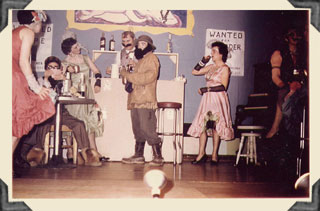
The Shooting of Dan McGrew: (left to right) Mary McLachlan, Betty
Perrin, Vi Blair, Dick Watts, Muriel Jones, Gladys Preston, and Marge
McLean (Jean Watts's leg at far right).
Dick
and I put our new expertise to use at mess parties, and our first
production was, appropriately, a revue entitled "The Naughty
Nuggets of '98" (a reference to the Klondike gold rush of 1898).
This hit show included a version of the perennial northern favourite,
Robert Service's The Shooting of Dan McGrew. Our cast was composed
of army wives, except for Dick, who got roped into the part of the
barman, none of the wives having enough experience for that part!
The
Brigadier's wife, Muriel Jones, in a full beard and moustache, played
the lead role of the miner who came in from the cold to shoot Dan
McGrew. She was a wonderful woman, a really good sort and an excellent
wife for a commanding officer. The cast and the behind-the-scenes
workers particularly appreciated her presentation of two great stage
props: "Wanted" posters for rape and murder, one with a
picture of the brigadier and the other, I think, with a picture of
the camp commandant!
During
this production, I seem to remember, some Whitehorse citizens, keeping
up the local traditions of gold rush days, brought little bags of
gold dust and flung them to the dancing girls onstage. Unfortunately
for our actresses, these gold-rush descendents came around to the
dressing rooms after the show and asked for their bags back. But we
did appreciate the gallant gesture!
Melodrama
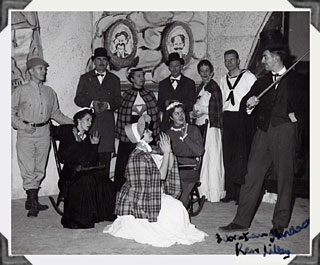
Because Their Hearts were Pure, or The Secret of the Mine
Back row: Goodwin Dalrymple (Tommy Tomlinson); the School Board: Mr.
Grimstone (Dick Watts), Miss Hatchett (Jean Watts), and Mr. Bleakly
(Ken Watts); Patience Faithful (Colleen McCaffrey); Will Faithful
(Ron Carr)
Front Row: Widow Dalrymple (Bonnie Cameron); Melody Truelove (Irene
Irons); Widow Truelove ( Margaret Sex); Sebastian Hardacre (Ken Lilley)
The
Whitehorse Drama Club's production of Because Their Hearts Were Pure,
or The Secret of the Mine was a great success, the setting of a mine
being particularly appropriate for a Yukon production. The audience
enthusiastically cheered the hero and hissed the villain, playing
their part like veterans. Both the hero and the villain were played
by Camp Takhini actors, the villain our RCAMC doctor, a young Englishman
with the north of England in his accent and exactly the right tall,
dark, and masterful qualities for the part. Bonnie Cameron, whose
husband was the mayor of Whitehorse, played one of the two hard done
by widows. The three members of the play's school board were all Wattses:
Dick, Jean, and Ken, who was a local resident and no relation. We
managed to get our share of hisses by being very unkind to the schoolteacher,
the long-suffering heroine, Melody Truelove.
After the success of this production, it was thought that a similar
melodrama would be a great draw for the expected influx of tourists
in the spring. We all started working with renewed enthusiasm on a
Victorian melodrama, The Drunkard.
Unfortunately,
HQ in Edmonton needed Dick there in the summer as a temporary replacement
officer. The CO in Edmonton was somewhat taken aback to receive a
telegram from the brigadier requesting that his Signals officer remain
in Whitehorse. The reason: Dick was in rehearsal for a leading role
in the melodrama that the Whitehorse Drama Club was hoping would attract
summer tourists! His plea, however, was in vain. Dick duly went to
Edmonton for the necessary few weeks and the play had to be abandoned,
much to the disgust of the drama club and the possibly deleterious
effect on the tourist trade.
Cassiar
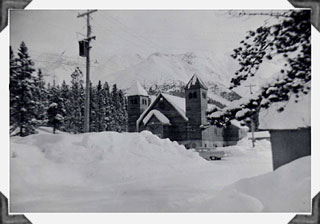
Cassiar, BC, 1960
One
Whitehorse Drama Club play, an English farce called See How They Run,
was first produced at the local school. It was such a success that
we were asked to take it on the road to Cassiar, a small asbestos-mining
town about eighty miles south of the BC/Yukon border.
This
being wintertime, cast and backstage people, with some scenery and
props, drove there in a chartered bus. A play was such an unusual
event in Cassiar that, before the performance, our eager audience
watched us making up through the windows of the building in which
we were to appear. We were warned not to worry if there seemed to
be a lot of talking going on in the audience during the play. It was
not that they intended to be impolite, but many of the miners were
foreigners, and their seat neighbours would be translating our lines
for them! Although the cast was somewhat thrown by this information,
the play went well. The audience members were attentive, their simultaneous
translation was not overwhelming, and they seemed to enjoy the play.
We enjoyed doing it, too.
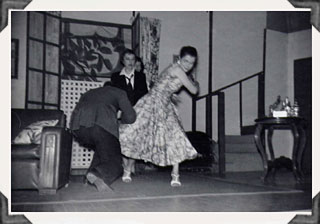
See How They Run: Don Stone, Jean Watts, and Marilyn Stone.
Although
we had brought some scenery and props with us, Cassiar provided the
furniture. Fortunately, we rehearsed beforehand. The seating provided
at stage centre was a two-part sectional sofa. At one crucial moment
our leading lady, Marilyn Stone, had to collapse onto it, and was
horrified to feel it begin to slide slowly but implacably apart beneath
her. A one-piece replacement sofa was found before the actual performance.
Of course, we might have got an extra laugh if we had kept the sectional!
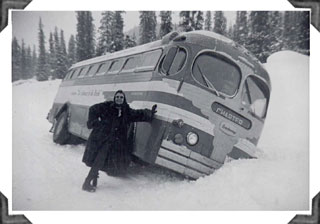
In the ditch, Cassiar, BC.
On
the way home, the bus driver had difficulty negotiating the snowed-in
road that ran from Cassiar to the Highway, and our bus went into the
ditch. The cast and crew climbed carefully out of the bus and gathered
to discuss this appropriately dramatic debacle. We wondered what time
of night we would be able to get back to our beds in Whitehorse. Fortunately,
help soon arrived from Cassiar in the form of a heavy-duty tow-truck,
which pulled the bus back on the road. All was well, and we took off
again for home with a little extra excitement to add to the tale of
our venture into touring.
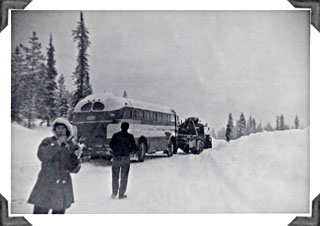
Out of the ditch.
[Next
Page]
Pages: [1]
[2] [3]
[4] [5]
[6] [7]
[8] [9]
[10] [11]
[12] [13] [14] [15]
[16]
Return to top of
page
Return to the Watts
Family page